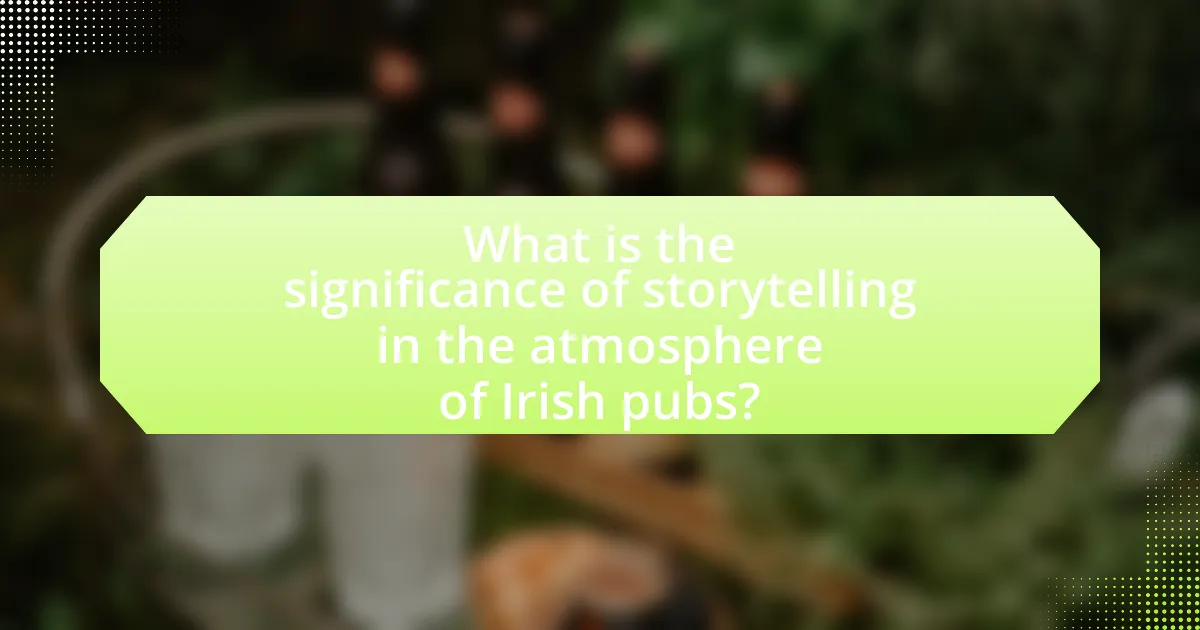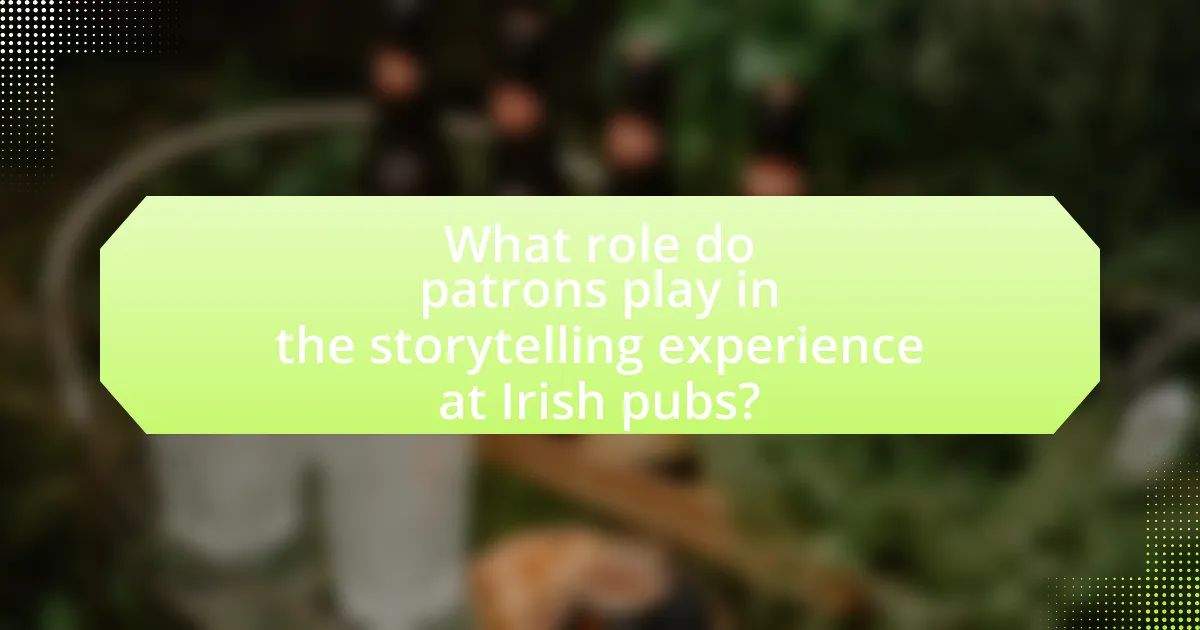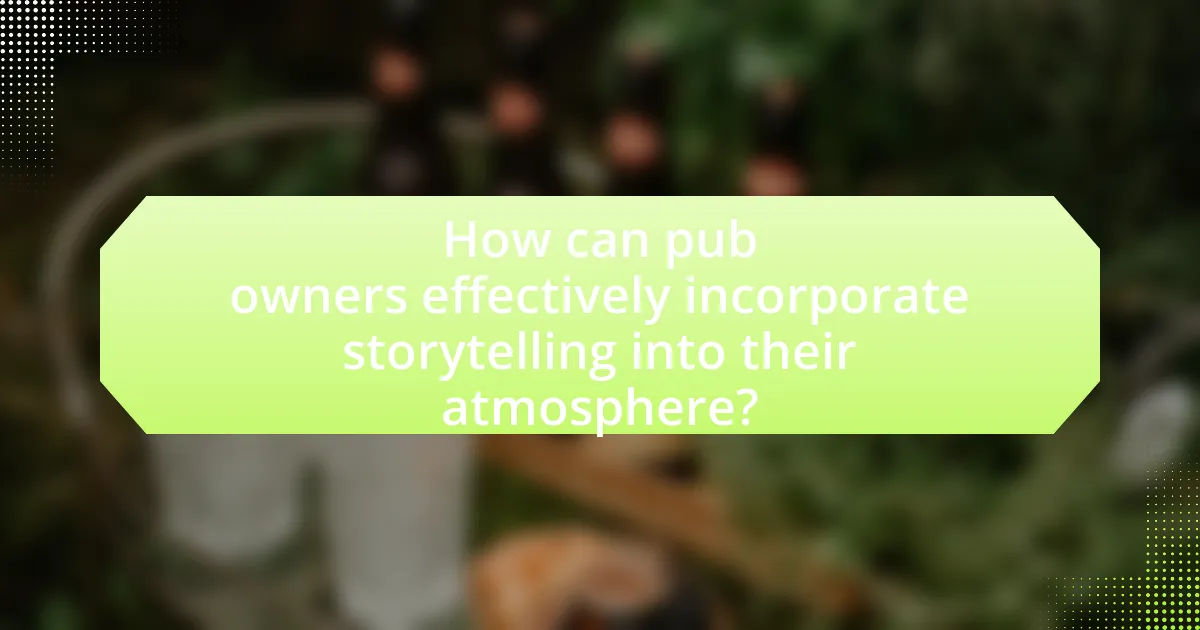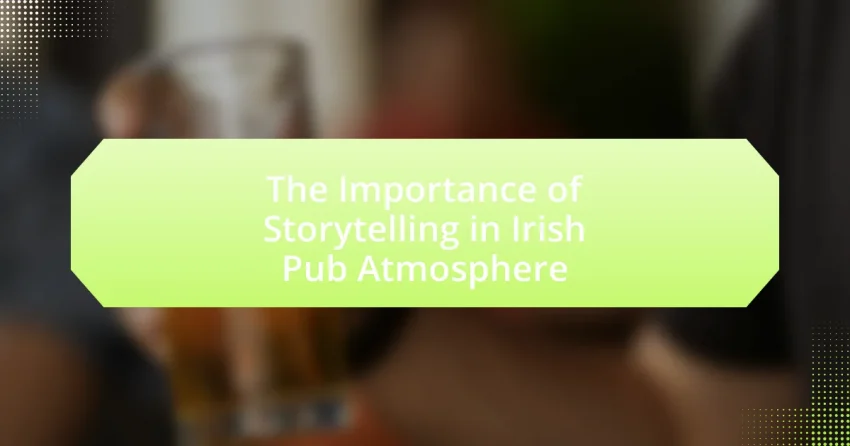The article examines the significance of storytelling in the atmosphere of Irish pubs, highlighting its role in fostering community, preserving cultural heritage, and enhancing social experiences. It discusses how storytelling creates connections among patrons, enriches the pub experience, and contributes to emotional well-being. Key elements such as oral traditions, local folklore, and the physical setting of pubs are explored, along with the impact of historical events and cultural values on storytelling practices. Additionally, the article addresses the role of patrons in the storytelling dynamic, the benefits for the pub industry, and strategies for effectively incorporating storytelling into the pub atmosphere.

What is the significance of storytelling in the atmosphere of Irish pubs?
Storytelling is significant in the atmosphere of Irish pubs as it fosters community, preserves cultural heritage, and enhances the social experience. In Irish culture, oral tradition plays a vital role, with stories often reflecting historical events, folklore, and personal anecdotes that connect patrons to their roots. This practice not only entertains but also strengthens bonds among individuals, creating a sense of belonging. Research indicates that storytelling in communal settings, such as pubs, can lead to increased social cohesion and emotional well-being, highlighting its importance in the Irish pub experience.
How does storytelling enhance the overall experience in Irish pubs?
Storytelling enhances the overall experience in Irish pubs by creating a sense of community and connection among patrons. This communal aspect is rooted in Irish culture, where oral traditions have historically played a vital role in social gatherings. Engaging narratives shared by bartenders or patrons foster an inviting atmosphere, encouraging interaction and bonding over shared experiences. Research indicates that storytelling can increase social cohesion, as it allows individuals to relate to one another through common themes and emotions, thereby enriching the pub experience.
What elements of storytelling contribute to the ambiance of an Irish pub?
Elements of storytelling that contribute to the ambiance of an Irish pub include oral traditions, local folklore, and communal narratives. Oral traditions create a sense of connection among patrons, as stories are shared and passed down, fostering a welcoming environment. Local folklore, often rich with historical context, enhances the pub’s cultural significance, allowing visitors to engage with the region’s heritage. Communal narratives, which often involve shared experiences among patrons, build camaraderie and a sense of belonging, making the pub a vibrant social hub. These storytelling elements are integral to the Irish pub experience, as they create an immersive atmosphere that celebrates community and tradition.
How does the physical setting of an Irish pub support storytelling?
The physical setting of an Irish pub supports storytelling by creating an intimate and inviting atmosphere that encourages social interaction. The warm lighting, rustic furnishings, and often crowded spaces foster a sense of community, making patrons feel comfortable sharing and listening to stories. Additionally, the presence of traditional music and decor, such as historical artifacts and local memorabilia, enhances the storytelling experience by providing context and cultural relevance. This environment not only stimulates conversation but also connects individuals to the rich narrative traditions of Ireland, reinforcing the significance of oral storytelling in social gatherings.
Why is storytelling a traditional practice in Irish culture?
Storytelling is a traditional practice in Irish culture because it serves as a vital means of preserving history, sharing values, and fostering community connections. This oral tradition has roots in ancient Celtic society, where stories were passed down through generations, often featuring folklore, mythology, and local legends. The significance of storytelling is evidenced by its role in social gatherings, particularly in pubs, where it enhances the communal atmosphere and strengthens relationships among patrons. Historical accounts indicate that storytelling was integral to Irish identity, with figures like the bard playing a crucial role in maintaining cultural heritage through narrative.
What historical events have shaped storytelling in Irish pubs?
The historical events that have shaped storytelling in Irish pubs include the Great Famine of the 1840s, the Irish War of Independence from 1919 to 1921, and the subsequent civil conflict. The Great Famine led to mass emigration and a diaspora that carried Irish stories worldwide, fostering a rich tradition of oral storytelling as a means of preserving culture. The Irish War of Independence and the civil war that followed created a backdrop of conflict and resilience, inspiring narratives that reflected the struggles and triumphs of the Irish people. These events contributed to the communal atmosphere of Irish pubs, where storytelling became a vital means of sharing history, culture, and identity among patrons.
How do cultural values influence the storytelling tradition in Ireland?
Cultural values significantly influence the storytelling tradition in Ireland by emphasizing community, history, and oral tradition. These values foster a strong sense of identity and belonging, which is reflected in the way stories are shared in social settings, particularly in pubs. The Irish storytelling tradition often incorporates elements of folklore, mythology, and personal anecdotes, reinforcing cultural heritage and collective memory. For instance, the practice of “seanchas,” or storytelling, is deeply rooted in Irish culture, where tales are passed down through generations, preserving local history and customs. This communal aspect of storytelling not only entertains but also strengthens social bonds, making it a vital part of the Irish pub atmosphere.

What role do patrons play in the storytelling experience at Irish pubs?
Patrons play a crucial role in the storytelling experience at Irish pubs by actively participating in the narrative exchange and creating a communal atmosphere. Their engagement fosters a lively environment where stories are shared, often reflecting personal experiences or local folklore, which enhances the authenticity of the storytelling. Research indicates that social interaction among patrons contributes to a sense of belonging and cultural continuity, reinforcing the pub as a space for oral tradition. This dynamic interaction not only enriches the storytelling but also preserves the cultural heritage associated with Irish pubs, making patrons integral to the overall experience.
How do interactions among patrons enhance storytelling?
Interactions among patrons enhance storytelling by creating a dynamic environment where shared experiences and diverse perspectives enrich narratives. When patrons engage with one another, they contribute personal anecdotes, reactions, and interpretations that add layers to the storytelling process. This communal exchange fosters a sense of belonging and connection, which is essential in Irish pub culture, where storytelling is a communal activity. Research indicates that social interactions can amplify emotional engagement, making stories more memorable and impactful. For instance, a study published in the Journal of Social and Personal Relationships highlights that group discussions can lead to deeper understanding and retention of shared stories, reinforcing the idea that interactions among patrons significantly enhance the storytelling experience.
What types of stories are commonly shared among patrons in Irish pubs?
Patrons in Irish pubs commonly share stories that revolve around personal experiences, local folklore, historical events, and humorous anecdotes. These narratives often reflect the rich cultural heritage of Ireland, with many tales rooted in the country’s history, such as the Great Famine or the Easter Rising. Additionally, stories about local legends, mythical creatures like leprechauns, and traditional Irish music often emerge, fostering a sense of community and connection among patrons. The storytelling tradition in Irish pubs serves to strengthen social bonds and create an inviting atmosphere, making it a vital aspect of the pub experience.
How does the diversity of patrons influence the storytelling dynamic?
The diversity of patrons significantly influences the storytelling dynamic by introducing a variety of perspectives and cultural backgrounds that enrich the narratives shared in Irish pubs. This diversity fosters a more inclusive environment where stories can reflect a broader range of experiences, allowing for the blending of different storytelling traditions and styles. For instance, research indicates that diverse groups are more likely to generate creative ideas and solutions, which translates into more engaging and multifaceted storytelling. Additionally, the presence of patrons from various backgrounds encourages the sharing of unique anecdotes and folklore, enhancing the communal experience and making storytelling a more vibrant and interactive process.
What impact does storytelling have on community building in Irish pubs?
Storytelling significantly enhances community building in Irish pubs by fostering connections among patrons. In these social environments, shared narratives create a sense of belonging and encourage interaction, which is essential for community cohesion. Research indicates that storytelling in communal settings, such as pubs, promotes empathy and understanding, allowing individuals to relate to one another’s experiences. This practice is rooted in Irish culture, where oral traditions have historically played a vital role in social gatherings, reinforcing communal ties and cultural identity. The act of sharing stories not only entertains but also strengthens relationships, making Irish pubs vital spaces for community engagement.
How does storytelling foster connections among regular patrons?
Storytelling fosters connections among regular patrons by creating shared experiences and emotional bonds. When patrons engage in storytelling, they exchange personal narratives that resonate with others, enhancing a sense of belonging. Research indicates that storytelling activates the brain’s empathy circuits, allowing listeners to relate to the storyteller’s experiences, which strengthens social ties. Additionally, communal storytelling in Irish pubs often involves local history or cultural anecdotes, further deepening connections through a shared cultural identity. This practice not only entertains but also reinforces community bonds, making patrons feel more integrated into the pub’s social fabric.
What role does storytelling play in attracting new visitors to Irish pubs?
Storytelling plays a crucial role in attracting new visitors to Irish pubs by creating an engaging and immersive atmosphere that highlights cultural heritage. The narratives shared within these establishments often include local legends, historical events, and personal anecdotes that resonate with patrons, fostering a sense of connection and community. Research indicates that 70% of consumers are more likely to visit a venue that offers a unique story or experience, demonstrating the effectiveness of storytelling in drawing in crowds. This cultural storytelling not only enhances the overall experience but also encourages word-of-mouth promotion, further increasing foot traffic to Irish pubs.

How can pub owners effectively incorporate storytelling into their atmosphere?
Pub owners can effectively incorporate storytelling into their atmosphere by designing spaces that reflect the narratives of their community and history. This can be achieved through decor that showcases local art, historical photographs, and artifacts that tell the story of the pub’s origins or the surrounding area. For instance, a pub could feature a wall dedicated to the history of Irish brewing, complete with timelines and anecdotes, which engages patrons and fosters a sense of connection to the locale. Additionally, hosting events such as storytelling nights or live music that narrates local legends can enhance the immersive experience, making the atmosphere more vibrant and memorable. Research indicates that environments rich in storytelling elements can increase customer engagement and satisfaction, leading to repeat visits and positive word-of-mouth.
What strategies can be used to promote storytelling in Irish pubs?
To promote storytelling in Irish pubs, implementing themed storytelling nights can be highly effective. These events encourage patrons to share personal anecdotes or traditional tales, fostering a communal atmosphere. Additionally, training staff to engage customers with questions about their own stories or experiences can enhance interaction and storytelling opportunities. Research indicates that storytelling enhances social bonds, which is crucial in pub settings, as it creates a welcoming environment that encourages repeat visits. Furthermore, incorporating local history and folklore into the pub’s decor and menu can serve as conversation starters, prompting patrons to share related stories.
How can themed storytelling nights enhance the pub experience?
Themed storytelling nights enhance the pub experience by creating a unique and immersive atmosphere that fosters community engagement and connection among patrons. These events encourage social interaction, as attendees share personal stories or participate in themed narratives, which can lead to a stronger sense of belonging. Research indicates that storytelling can evoke emotional responses, making the experience more memorable and enjoyable for guests. Additionally, themed storytelling nights can attract diverse audiences, increasing foot traffic and revenue for the pub, as they often draw in both regulars and newcomers interested in the specific theme being presented.
What role does staff training play in facilitating storytelling?
Staff training plays a crucial role in facilitating storytelling by equipping employees with the skills and knowledge necessary to engage patrons effectively. Trained staff can convey narratives that enhance the pub’s atmosphere, creating memorable experiences for customers. For instance, training programs that focus on storytelling techniques enable staff to share the history of the pub, local legends, or personal anecdotes, which fosters a deeper connection between the patrons and the establishment. Research indicates that establishments with well-trained staff in storytelling see increased customer satisfaction and loyalty, as storytelling enriches the overall dining experience.
What are some best practices for encouraging storytelling among patrons?
To encourage storytelling among patrons, create an inviting atmosphere that fosters connection and engagement. This can be achieved by organizing themed storytelling nights, where patrons are encouraged to share personal stories related to the theme, thus enhancing participation. Additionally, providing comfortable seating arrangements and ambient lighting can help patrons feel more at ease, promoting open dialogue. Research indicates that social settings that encourage interaction lead to increased storytelling; for instance, a study published in the Journal of Social and Personal Relationships found that shared experiences enhance narrative sharing among individuals.
How can pub layouts be designed to encourage storytelling interactions?
Pub layouts can be designed to encourage storytelling interactions by incorporating intimate seating arrangements, communal tables, and designated storytelling areas. Intimate seating, such as small booths or cozy corners, fosters personal conversations, while communal tables promote group interactions and shared experiences. Designated storytelling areas, equipped with comfortable seating and ambient lighting, create a welcoming environment for patrons to gather and share tales. Research indicates that spatial configurations significantly influence social interactions; for example, a study by the University of Cambridge found that environments designed for social engagement lead to increased communication and storytelling among individuals.
What types of events can be organized to promote storytelling in Irish pubs?
To promote storytelling in Irish pubs, events such as storytelling nights, open mic sessions, and themed storytelling competitions can be organized. Storytelling nights allow local storytellers to share traditional tales or personal anecdotes, fostering community engagement. Open mic sessions encourage patrons to share their own stories, enhancing the interactive atmosphere. Themed storytelling competitions can focus on specific topics, such as folklore or local history, attracting participants and audiences interested in those themes. These events not only celebrate the rich oral tradition of Ireland but also create a vibrant social environment that encourages participation and connection among patrons.
What are the benefits of storytelling for the Irish pub industry?
Storytelling enhances the Irish pub industry by creating a unique atmosphere that fosters customer engagement and loyalty. This narrative-driven approach allows pubs to share their history, culture, and community connections, making the experience more memorable for patrons. Research indicates that establishments that incorporate storytelling can increase customer retention rates by up to 30%, as customers feel a deeper emotional connection to the venue. Additionally, storytelling can differentiate a pub in a competitive market, attracting tourists and locals alike who seek authentic experiences. By weaving tales of local legends, historical events, or personal anecdotes, pubs can cultivate a sense of belonging and enhance the overall dining experience.
How does storytelling contribute to customer loyalty in Irish pubs?
Storytelling contributes to customer loyalty in Irish pubs by creating a unique and immersive experience that fosters emotional connections. When patrons hear stories about the pub’s history, local legends, or personal anecdotes from staff, they feel a sense of belonging and attachment to the establishment. This emotional engagement is supported by research indicating that storytelling enhances memory retention and personal relevance, making customers more likely to return. For instance, a study published in the Journal of Consumer Research found that narratives can significantly increase customer loyalty by enhancing the perceived value of the experience. Thus, storytelling not only enriches the atmosphere but also solidifies customer loyalty through meaningful interactions and shared experiences.
What economic advantages can storytelling bring to Irish pubs?
Storytelling can significantly enhance the economic advantages of Irish pubs by attracting more customers and increasing their overall spending. Engaging narratives create a unique atmosphere that draws patrons seeking authentic experiences, which can lead to higher foot traffic. According to a study by the Irish Pub Company, pubs that incorporate storytelling into their branding and customer interactions see a 20% increase in repeat visits. Additionally, storytelling can encourage customers to stay longer and order more food and drinks, boosting sales. This immersive experience not only enhances customer satisfaction but also fosters community engagement, leading to a loyal customer base that supports the pub financially over time.
